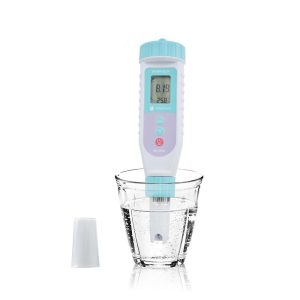Working principle, operation method and maintenance of water quality testing pen

Water quality testing pen is a portable water quality testing instrument, which is often used to measure various indicators of water, such as pH value, dissolved oxygen, electrical conductivity, etc. The following is an overview of the general working principle, operation method and maintenance of water quality testing pens:
How it works
Water quality detection pens usually use the principle of sensors or electrodes to measure water indicators. Different detection pens have different sensors or electrodes, such as pH detection pens have pH electrodes, dissolved oxygen detection pens have dissolved oxygen sensors, etc. These sensors or electrodes are connected to circuits inside the instrument and determine water quality parameters by measuring physical or chemical changes between the water body and the electrode.

Water quality testing pen is a portable water quality testing instrument, which is often used to measure various indicators of water, such as pH value, dissolved oxygen, electrical conductivity, etc. The following is an overview of the general working principle, operation method and maintenance of water quality testing pens:
How it works
Water quality detection pens usually use the principle of sensors or electrodes to measure water indicators. Different detection pens have different sensors or electrodes, such as pH detection pens have pH electrodes, dissolved oxygen detection pens have dissolved oxygen sensors, etc. These sensors or electrodes are connected to circuits inside the instrument and determine water quality parameters by measuring physical or chemical changes between the water body and the electrode.
Working principle, operation method and maintenance of water quality testing pen
Method of operation
Preparation: Ensure that the water quality test pen is calibrated or in normal working condition, and select the corresponding parameters (such as pH, dissolved oxygen, conductivity, etc.) as required.
Sampling: Use a sampling container to collect water samples to be tested to avoid contamination or air bubbles.
Measurement: Dip the sensor or electrode of the water quality detection pen into the water sample to ensure that the sensor is in full contact with the water sample. Wait for a while until the reading is stable.
Record results: Record the measurement results, usually in numerical form displayed on the screen of the instrument. Measurements at multiple locations or at multiple points in time can be recorded as required.
Repair and maintenance
Clean the sensor or electrode of the water quality test pen regularly to avoid the accumulation of pollutants or salt scale. Use purified water or appropriate cleaning solution for cleaning, follow the manufacturer’s cleaning instructions.
Calibrate water quality test pens regularly to ensure accuracy and reliability. The calibration frequency depends on the frequency of use and requirements, and it is generally recommended to perform calibration at intervals or after electrode replacement.
When storing water quality test pens, take care to keep them dry and in the proper temperature range. Avoid prolonged exposure to high, low, or humid conditions.
Follow the operating instructions in the operating manual to avoid over-bending or over-stretching the cable, and to avoid violent vibration or collision. During use, pay attention to protect the instrument from serious contamination or damage.
Repair and maintenance should be carried out according to the specific water quality test pen model and manufacturer’s recommendation. If there is a fault or problem, it is recommended to contact the manufacturer or professional technical personnel for repair or consultation.
Working principle, operation method and maintenance of water quality testing pen
Method of operation
Preparation: Ensure that the water quality test pen is calibrated or in normal working condition, and select the corresponding parameters (such as pH, dissolved oxygen, conductivity, etc.) as required.
Sampling: Use a sampling container to collect water samples to be tested to avoid contamination or air bubbles.
Measurement: Dip the sensor or electrode of the water quality detection pen into the water sample to ensure that the sensor is in full contact with the water sample. Wait for a while until the reading is stable.
Record results: Record the measurement results, usually in numerical form displayed on the screen of the instrument. Measurements at multiple locations or at multiple points in time can be recorded as required.
Repair and maintenance
Clean the sensor or electrode of the water quality test pen regularly to avoid the accumulation of pollutants or salt scale. Use purified water or appropriate cleaning solution for cleaning, follow the manufacturer’s cleaning instructions.
Calibrate water quality test pens regularly to ensure accuracy and reliability. The calibration frequency depends on the frequency of use and requirements, and it is generally recommended to perform calibration at intervals or after electrode replacement.
Working principle, operation method and maintenance of water quality testing pen
When storing water quality test pens, take care to keep them dry and in the proper temperature range. Avoid prolonged exposure to high, low, or humid conditions.
Follow the operating instructions in the operating manual to avoid over-bending or over-stretching the cable, and to avoid violent vibration or collision. During use, pay attention to protect the instrument from serious contamination or damage.
Repair and maintenance should be carried out according to the specific water quality test pen model and manufacturer’s recommendation. If there is a fault or problem, it is recommended to contact the manufacturer or professional technical personnel for repair or consultation.
